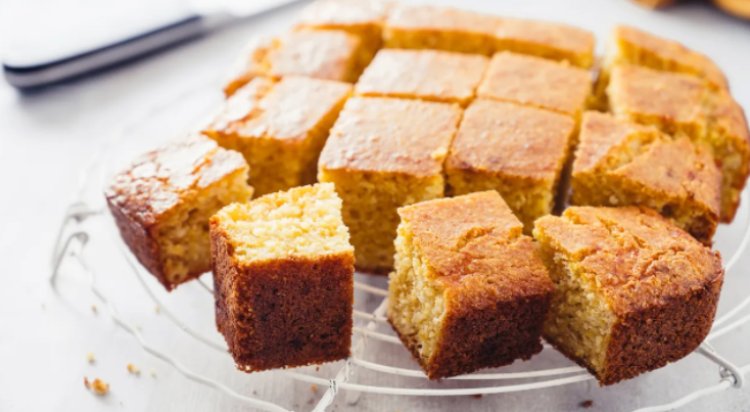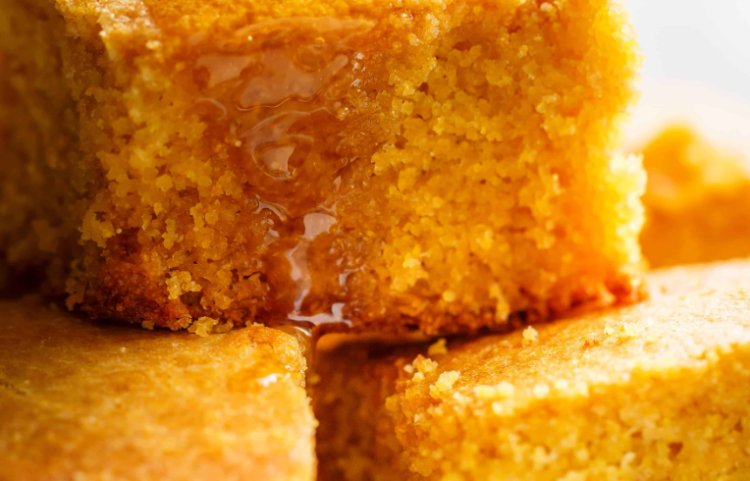How to Prepare a Fluffy Golden Buttermilk Cornbread
This Easy Buttermilk Cornbread recipe has been steeped in tradition in the past, but it has been slightly improved to make it even better. It is so versatile that it can be made in a skillet or a baking dish, and everything is done in one bowl.

The importance of measuring cornbread ingredients
Cornbread is simple to make, but the ratio of components is crucial to its success. When the ratio of ingredients is measured incorrectly, the cornbread will be dry, crumbly, and flavorless; but, when done correctly, it will be tender, moist, flavorful, and buttery. Here are the ingredients that matter when it comes to measuring;
Butter: One of the main flavors in this cornbread recipe is butter. When compared to oil, butter gives the cornbread a greater taste, while oil moistens and tenderizes the bread.
Buttermilk: Buttermilk is necessary for baking cornbread since it makes it extra moist and flavorful.
Cornmeal: Cornmeal is ground corn that has been dried. The best cornbread is made with equal parts fine cornmeal and flour; hence, 1 cup of cornmeal and 1 cup of flour yields crunchy cornbread edges.
Brown Sugar/Honey: A pinch of brown sugar and a drizzle of honey round out the corn flavor. White sugar can also be used, but it adds no flavor to the cake.

Tips for making the perfect cornbread
The most important step in making cornbread into something truly wonderful is to preheat your pan or dish in a preheated oven before proceeding. If you want the cornbread to have that beautiful crispy edge, you'll need to go through this step.
Once the butter has melted, turn off the heat, but leave your skillet on the stove. This allows the butter to melt somewhat before adding it to the bread batter while keeping the skillet hot enough for a perfect sizzling when the batter is poured in.
Make sure there are no lumps in your dry ingredients before mixing them. Overmixing your batter will result in tough cornbread.
Brown sugar softens the cornmeal in the middle while complementing the honey in this recipe.
The batter is slightly fluffier than traditional cornbread when a teaspoon of baking powder is added. If you want a denser cornbread, skip the baking powder.
1/4 cup of honey is great for cornbread, but two tablespoons of honey will give it a gentle taste of sweetness. You can always alter the sugar and honey to your preferred sweetness level.
Ingredients
1 cup yellow cornmeal or polenta
1 cup all-purpose flour
1 cup buttermilk
2 eggs
1/2 cup unsalted butter melted and cooled slightly
1/4 cup brown sugar or white granulated sugar
1 teaspoon baking powder, optional
1/2 teaspoon baking soda
1/4 teaspoon salt
1/4 cup honey
Procedure
Preheat the oven to 200 degrees Celsius | 400 degrees Fahrenheit and place a rack in the middle. Butter a 9-inch cast-iron pan or a 9-inch square baking dish lightly and heat it in the oven.
For cast iron skillets, melt 1/2 cup unsalted butter in a cast-iron skillet over medium heat until melted, then remove from heat and set aside to cool somewhat before adding to the batter.
Combine the flour, cornmeal, sugar, baking powder, baking soda, and salt in a large mixing basin.
Make a well in the center of the bowl, and pour in the buttermilk, honey, and eggs. Toss everything together thoroughly, then add the somewhat cooled melted butter.
Gently remove your heated skillet or dish from the oven and carefully pour the batter into it.
Bake until the top of the cornbread begins to brown (20-25 minutes)
If a toothpick inserted in the center of the cornbread comes out clean, it is cooked.
Allow the cornbread 10 minutes to cool before slicing and serving.
Conclusion
Cornbread can be sweet or savory, and it's usually eaten with soup, stew, or chili, topped with butter. Unlike other forms of bread, cornbread does not include yeast and is classified as a quick bread, meaning it rises quickly.
Nutritional value of cornbread
Cornbread contains phosphorus, a body’s mineral for bone health, energy production, and DNA synthesis. It also contains a lot of sodium, a nutrient that helps regulate fluid balance and blood pressure. Cornbread also contains thiamine, niacin, folate, riboflavin, and other B vitamins. These nutrients are important for brain function, protein synthesis, and immunological health.


























